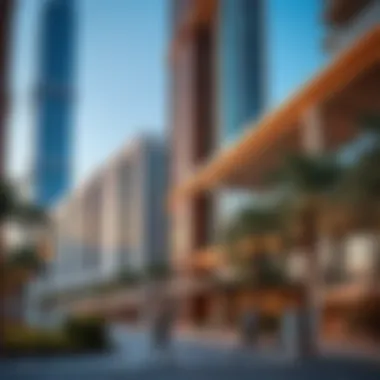Navigating the Cost of Living in Dubai: A Comprehensive Guide


Intro
The cost of living in a bustling metropolis like Dubai can be bewildering for both newcomers and long-term residents. Nestled in the heart of the Arabian Peninsula, Dubai shines as a global city renowned for its luxury and modernity. However, as with any vibrant urban center, understanding the financial landscape is paramount. This article peels back the layers to present a thorough examination of what individuals and families truly face when budgeting for life in this remarkable city.
While Dubai may portray a facade of opulence, the costs associated with housing, transportation, food, and education are not simply numbers pulled from thin air. Each coin spent offers insight into the city’s economy, including prevailing trends that influence living expenses. For instance, expatriates often find themselves caught between the allure of luxury living and the realities of their wallets, as housing prices can swing wildly depending on location and amenities.
In this article, we will sift through the fabric of Dubai's economic landscape. We provide a critical analysis of market trends, property options, and the essential costs that shape daily life. Notably, understanding these elements can equip prospective movers and current residents with the knowledge they need to navigate this splendid, yet challenging, financial terrain.
Housing Costs in Dubai
Housing expenses stand as one of the most significant components of the cost of living in Dubai. Understanding this dimension is crucial for anyone looking to settle in this thriving metropolis. The housing market in Dubai can be a mix of high-end luxury properties, mid-range accommodations, and more practical options that cater to diverse financial capabilities. Investors, homebuyers, and even renters need to sift through the offerings to find what best aligns with their needs and budgets.
The myriad of choices not only reflects the city's diverse population, but also its ambition to provide accommodation that meets the expectations of its residents, from expatriates to locals. Given that housing expenses can dramatically affect overall financial planning, it is essential to delve into the types of housing available, rental prices, and associated maintenance costs.
Types of Housing Available
Housing in Dubai is categorized into several types, each with its own unique characteristics and benefits. Options include luxurious villas, modern apartments, and budget-friendly shared accommodations.
- Luxury Villas: Typically found in upscale neighborhoods, these often come with extensive amenities such as private pools and landscaped gardens. They are ideal for families and those who value space.
- High-rise Apartments: These are prevalent in areas like Downtown Dubai and offer stunning views, along with a range of facilities—perfect for young professionals seeking an urban lifestyle.
- Shared Accommodation: This option is more common among newcomers and students, where living with roommates can significantly reduce overall rent costs.
Average Rent Prices
Rent prices in Dubai vary remarkably based on location, housing type, and amenities. Navigating through this rental landscape is essential for budgeting.
Luxury Apartments
Luxury apartments boast prime locations and extravagant facilities like gyms, swimming pools, and concierge services. Generally priced higher than other options, these properties cater to those seeking a prestigious lifestyle. For example, a two-bedroom luxury apartment can easily command rents upwards of AED 12,000 per month in desirable areas like Dubai Marina. While these homes offer high comfort and status, they come with a substantial financial commitment.
Mid-range Options
Mid-range apartments serve as a sweet spot for many expatriates looking for balance between cost and comfort. These can be found in neighborhoods like Al Barsha and Jumeirah Village Circle and typically cost around AED 6,000 to AED 10,000 for a two-bedroom unit. They provide decent amenities while being more economical than luxury choices. It’s a viable route for families or individuals not seeking opulence, yet still desiring a high quality of life.
Affordable Housing
Affordable housing solutions are vital for low to mid-income residents. Locations such as International City offer apartments at lower price points, often ranging from AED 3,000 to AED 5,500 per month for a one-bedroom unit. While these accommodations may lack some amenities found in higher-cost options, they provide essential living space and are often near transport links, making them a popular choice for budget-conscious individuals.
Utilities and Maintenance Expenses
When budgeting for housing, it's crucial to also factor in utilities and maintenance costs—these can add up quickly.
Electricity and Water Costs
Utilities in Dubai can be relatively high, particularly in summer months when air conditioning becomes a necessity. The average monthly bills for electricity and water generally range from AED 300 to AED 800, depending on the size of the accommodation and energy consumption habits. New residents often underestimate these costs, so a prudent approach may entail setting aside AED 600 to AED 1,000 monthly on average.
Internet and Cable Services
Internet and cable services are essential in today's digital age. Basic packages in Dubai typically start around AED 300 and can go up, depending on the speed and coverage desired. Given how critical these services are for both work and leisure, it's advisable to check the options available from local providers like Etisalat or du to ensure you make an informed decision.
Overall, understanding the vast landscape of housing costs in Dubai can significantly aid in making informed decisions for potential residents or investors. Armed with detailed insights, navigating the Dubai housing market can transform from a daunting task to a rewarding venture, ensuring that one finds suitable living arrangements that align with both budget and lifestyle.
Transportation Costs
When residents and visitors think about living in Dubai, transportation costs often weigh heavily in their decision-making. Understanding the nuances in transportation options—from public systems to private vehicles—can shape one’s budget in significant ways. In this vibrant metropolis, the landscape of transportation is not only about getting from point A to B; it involves convenience, efficiency, and sometimes, personal preference. As costs rise in various living sectors, making informed choices in transportation can ensure financial stability for everyone—from busy professionals to families.
Public Transport Overview
Dubai’s public transport system is a considerable asset to anyone looking to save on transportation costs. It is well-structured, accessible, and, importantly, convenient for those who live and work in the city.
Metro System
The Metro System in Dubai stands as a key feature of the city's public transport framework. Spanning over 75 kilometers, it connects various neighborhoods with efficiency and speed. One of the standout characteristics of the Metro is its automatic operation, which minimizes wait times and maximizes travel efficiency. This convenience draws in commuters, especially during rush hour.
On top of that, the Metro is an economical choice considering the cost-effectiveness of its fares. Daily, weekly, or monthly passes can diminish transportation expenditures, making it attractive for daily commuters. However, an aspect to consider is that the metro does not service all parts of the city, potentially inconveniencing those living in areas without direct access.
Buses
Buses in Dubai also play a major role in the public transport ecosystem. They complement the Metro and offer an accessible option for areas not covered by the rail system. Buses are known for their extensive network, connecting various distant places to central hubs. Such a feature offers a key advantage when looking to explore the city without breaking the bank.
Furthermore, bus fares are quite economical, and with options for prepaid cards, users can further streamline their travel experiences. Nonetheless, traveling by bus can sometimes mean longer transit times due to frequent stops and possible delays during high traffic hours.
Water Transport
Water Transport, specifically the abras and water taxis, presents a unique way to navigate Dubai's waterways. This method not only serves a functional purpose but also offers stunning views of the city from the water. Abras are especially popular and provide an authentic experience of crossing the Dubai Creek at a minimal cost.
While the water transport system is beneficial for those wishing to avoid land traffic, it does have limitations in terms of routes and schedules. Travelers should factor in any waiting times and navigate seasonality, where weather conditions may interfere with service availability.
Private Vehicle Expenses
For many, owning a private vehicle is an everyday reality that adds another layer to the overall cost of living in Dubai. It's essential to consider this means of transport if commuting is a priority for one’s lifestyle. However, the financial implications go beyond just the purchase price of a vehicle.
Fuel Prices
Fuel prices in Dubai are among the most competitive in the globe, making this city a haven for car owners. The average price per liter is significantly lower than in many Western cities, which compensates for the initial costs of buying a vehicle. This allows individuals to budget more comfortably for fuel expenses, especially if they find themselves on the road frequently.


However, when considering fuel prices, it’s worthwhile to look at driving habits. The price can be cheap, but extensive daily driving can still dent the budget over time, so it’s essential to strike a balance.
Insurance and Registration
Insurance and registration for vehicles are required by law and should be factored into total transport costs. Registration fees vary depending on the vehicle's make and model, along with its age. Car insurance presents an ongoing expense that ranges widely based on the coverage level. Residents must ensure they budget for such costs to avoid surprises.
Additionally, while premiums may seem affordable compared to some countries, factors like driving violations can hike prices. Maintaining a clean driving record could therefore save money long term.
Parking and Tolls
Parking and tolls can add a surprising amount to monthly expenses. In busy districts, paid parking is common, and many places have limited options available. Thus, budgeters must anticipate these costs, which can accumulate quickly if frequent visits to commercial centers or attractions are on the agenda.
Tolls also apply to certain key routes, especially bridges and major highways. While they ensure smoother commutes, they require planning into the travel budget. Visitors should verify toll systems to avoid unexpected fees during trips.
Overall, comprehensively understanding transportation costs in Dubai is essential for anyone considering living in this illustrious city. By evaluating options and expenses carefully, one can make informed decisions that enhance lifestyle without scrutinizing finances unduly.
Grocery and Food Expenses
Navigating the grocery and food expenses in Dubai is crucial for anyone considering moving to this city. Depending on personal choices, dietary needs, and family size, these costs can vary significantly. Whether you're a health-conscious individual or a foodie eager to explore local cuisine, understanding the financial landscape surrounding groceries and meals can help maintain a true sense of financial stability.
Average Grocery Costs
When it comes to grocery prices, Dubai can be both an eye-opener and a reality check. On one hand, fresh produce tends to cost less than many Western cities, thanks to its proximity to farming regions in surrounding emirates like Ras Al Khaimah. On average, a monthly grocery bill for one person can typically range between AED 800 to AED 1,200. This includes staples like rice, bread, meat, and vegetables.
The price of specific items varies, but here's a rough idea of what you might pay:
- Milk (1 liter): AED 10
- Chicken breast (1 kg): AED 30
- Apples (1 kg): AED 8
- Eggs (dozen): AED 15
These prices, while generally competitive, can be influenced by whether you choose to shop at local markets or larger supermarket chains such as Carrefour or Lulu Hypermarket, which often have promotional deals.
Dining Out Costs
Eating out is an integral part of Dubai's vibrant culture. From casual eateries to luxury establishments, the options are abundant. Dining out can significantly affect your budget, depending on the type of experience you are after.
Casual Dining
Casual dining is often viewed as a stress-free way to enjoy meals without breaking the bank. Prices in such establishments typically range from AED 30 to AED 80 per dish. A unique aspect of casual dining in Dubai is the blend of cuisines available—from Mediterranean to Asian fare. This diversity allows residents and visitors to enjoy global dishes at reasonable prices.
The advantage of casual dining is clear: it's often budget-friendly, and you can find satisfying meals that fit various tastes. However, the downside may be long wait times during peak hours, especially in popular districts like Jumeirah or Downtown.
Fine Dining
For those looking to indulge, fine dining presents a luxury experience that cannot be overlooked. With establishments like Zuma and Nobu, a meal can easily start at AED 300 and go up significantly, depending on the selected menu and wines. These restaurants often serve beautifully crafted dishes that reflect the influence of some of the world's leading chefs.
Fine dining's key characteristic is its ambiance and service, which aims to create an unforgettable experience rather than just a meal. On the downside, frequent visits can strain your wallet, making it less sustainable for regular dining.
Street Food Options
Street food options in Dubai are a delightful discovery for many. They allow you to sample authentic local flavors without stretching your wallet too thin. Meals from street vendors typically range between AED 10 to AED 30, offering everything from shawarmas to falafels.
What makes street food stand out is the lively atmosphere and accessibility; you'll often find vendors in bustling areas, especially during evening hours. However, the attention to hygiene can vary, so it’s wise to choose vendors that maintain a good reputation.
Eating out, whether it's casual or fine dining, or even grabbing a quick bite from a street vendor, contributes significantly to the cultural experience of living in Dubai. However, it is essential to incorporate these expenses into your overall budget plan.
Healthcare Costs
When it comes to the cost of living in Dubai, understanding healthcare costs is critical. The healthcare system in the UAE is both advanced and expansive, making it essential for residents, especially expatriates, to grasp how much they should budget for medical care. This section provides essential insights into health insurance requirements, healthcare expenses faced by residents, and the different types of medical services available.
Health Insurance Requirements
In Dubai, health insurance is not just a luxury; it's a legal requirement for all residents. Whether you are an expatriate or a local citizen, having health coverage is crucial to ensure you are financially protected from unexpected medical expenses. The government mandates that employers provide insurance to their workers; however, the quality and extent of coverage can vary significantly depending on the plan.
In general, employers usually offer basic plans that cover essential services, but these often come with limitations. As a resident, it’s also wise to review and possibly supplement your insurance to secure coverage for outpatient services, dental care, and preventative treatments, which are not always included in standard plans.
Healthcare Expenses for Residents
Healthcare in Dubai can vary widely in cost, influenced by the type of service and facility chosen. Below are the key components of healthcare costs that every resident should be aware of:
General Practitioner Visits
A visit to a general practitioner, or GP, is typically the first line of defense for any health concerns. In Dubai, the cost for an appointment with a GP can range from AED 150 to AED 500, depending on the clinic or hospital. Most insurance plans cover GP visits, making it a favored option for many.
- Key Points:
- Accessible for various health concerns.
- Lower cost compared to specialists.
The advantage of visiting a GP first is that they can refer you to specialists as needed, ensuring you get the correct care without unnecessary expenses. However, if your health issue requires immediate attention or specialist knowledge, relying solely on a GP may delay treatment; it’s crucial to assess your symptoms carefully.
Specialist Appointments
When more specialized attention is required, residents may need to consult with specialists, such as dermatologists or orthopedists. Appointments with specialists average between AED 300 to AED 1,200, depending on the doctor's experience and the clinic's prestige.
- Key Points:
- Direct access to specific health expertise.
- Often require a referral from a GP, adding another step and cost.


Specialists offer in-depth knowledge and can provide tailored treatments based on your individual needs. On the downside, their appointments can be costly, particularly if you don't have comprehensive insurance coverage.
Emergency Services
In case of critical situations, emergency services are vital. The costs for ambulance services can range from AED 500 to AED 1,000, with hospital admission fees varying widely based on the facility and the level of care required.
- Key Points:
- Important for urgent and life-threatening situations.
- Costs can escalate without insurance coverage.
The unique benefit of emergency services is their ability to provide immediate care when time is of the essence. However, the financial burden can be significant if you're unprepared, highlighting the importance of having adequate health insurance to cover emergencies.
Understanding these healthcare costs helps residents better navigate their financial responsibilities in Dubai, ensuring they are equipped to manage both routine and unexpected medical expenses.
Educational Costs
Understanding the costs associated with education is essential for families relocating to Dubai. Education not only shapes the future of children, but it also plays a significant role in a family's overall financial planning. As a bustling city filled with opportunities, Dubai offers a diverse educational landscape, tailored to the needs of its expatriate population.
Schooling Options for Expat Families
International Schools
International schools represent a critical part of the educational scene in Dubai. Catering primarily to the expatriate community, these schools offer curricula from countries around the world, such as the British, American, and International Baccalaureate systems. This variety ensures that children receive education that aligns closely with their family's home country, helping them feel more at ease during the transition.
Key characteristics of international schools include:
- Diverse Curriculum: This allows children to continue learning in a familiar context, aiding their adjustment to a new environment.
- Multicultural Environment: Classrooms are often a melting pot of cultures, promoting understanding and global citizenship.
Despite the benefits, there are considerations. The fees can be quite steep, usually ranging from 30,000 AED to well over 100,000 AED per year, depending on the school's reputation and location. This expense might make budgeting a tricky endeavor for some families.
Local Schools
In contrast, local schools offer an alternative for families who have settled in Dubai for a longer term or wish to immerse their children in the local culture. The education system in UAE public schools is based on the Ministry of Education's standards, which typically focus on the Arabic language and Islamic studies.
The distinctive feature of local schools is:
- Affordable Fees: Costs are usually much lower than those of international schools, making them a more feasible option for families concerned about expenses.
However, local schools often have limited options regarding curricular diversity, which may not always align with the expectations of expatriate families used to other educational styles. Families might struggle if they want their children to maintain proficiency in their native language since the primary language of instruction is Arabic.
Tuition Fees Overview
Primary and Secondary Education
When it comes to primary and secondary education, it’s vital to factor in the range of tuition fees across various schools. Private schooling tends to be the norm in Dubai and can vary vastly based on the quality and prestige of the institution. Many expat families choose private institutions due to the advantages they offer, including smaller class sizes and enhanced extracurricular activities.
Considerations regarding tuition:
- High Demand: Popular schools with good reputations often have long waiting lists, so planning ahead is crucial for securing a place.
- Annual Fees: The yearly fees can escalate significantly, often requiring upfront payments which can put a strain on a family's budget.
In relation to financial planning, understanding these costs becomes fundamental in preparing for a family's yearly expenditures.
Tertiary Education Costs
Tertiary education is another component that deserves attention. Dubai entertains a growing number of universities, many of which have international affiliations. This provides high school graduates with the opportunity to pursue higher education close to home while preserving the chance to receive a globally recognized degree.
Important aspects here include:
- Tuition Fees: These can range widely, from 40,000 AED to upwards of 100,000 AED per year depending on the course and institution. It’s a steep investment, reflecting the quality of education and resources available.
- Living Expenses: Students should also factor in living costs, which encompass accommodation, food, and transportation.
Recreation and Entertainment Costs
Recreation and entertainment costs form a significant part of one's budget, particularly in a vibrant city like Dubai. This aspect of living expenses allows residents to take a breather from their daily grind. Engaging in leisure activities is crucial for maintaining balance and mental wellbeing. Those who want to enjoy the full experience of Dubai should consider these costs seriously. With its multitude of options ranging from cultural experiences to exhilarating sports, understanding how much to allocate for these activities can be very beneficial.
Cultural Activities
Cultural activities in Dubai draw a diverse crowd from various backgrounds. Museums, art galleries, and traditional performances are abundant. For instance, places like the Dubai Opera and the Dubai Museum not only provide entertainment but also rich insights into the region's history and culture. Attending cultural festivals can also be a thrilling experience.
These activities tend to vary significantly in price. While some may be on the pricier side, like special exhibits at the Louvre Abu Dhabi, there are also free events organized by the local government that are equally enriching. Knowing where to look for deals and promotions can help residents enjoy the cultural scene without emptying their wallets.
Sports and Fitness Expenses
Gym Memberships
Gym memberships offer a pathway to a healthier lifestyle, which is crucial in fast-paced living like in Dubai. Many people see them as indispensable. Most gyms provide flexibility through a variety of plans, from monthly to yearly memberships. This adaptability is one key characteristic that makes gym membership appealing. Accessibility is another, with gyms usually available in nearly every neighborhood.
The downside is that the costs can be quite high, especially for premium gyms that offer extra amenities like swimming pools, personal trainers, or advanced fitness classes. It’s worth considering what each gym offers to find the best fit for your fitness goals and budget. Do some research to identify local gyms that offer trial memberships. It can save you a bit of money if you find it’s not for you.
Sports Clubs
Joining sports clubs is another popular choice for residents seeking both fitness and community engagement. Clubs like the Dubai Rugby Sevens or cricket clubs provide not only sports activities but also social opportunities. Membership often allows access to facilities not available to the general public, which is a compelling draw.
Nonetheless, the costs associated with sports clubs can differ widely. Some charge on a monthly basis, while others might have initial registration fees. For newcomers, it’s advisable to weigh the benefits against the cost, especially if you're looking at specialized clubs that may demand a higher investment.
Leisure Activities and Attractions


Theme Parks
Dubai is renowned for its extravagant theme parks, such as IMG Worlds of Adventure and Motiongate. These parks cater to thrill-seekers and family outings alike. A day at a theme park can be a delightful escape from daily routines, offering a chance to indulge in fun and adventure. The cost for family tickets may add up quickly, however, so planning ahead is essential.
For those considering multiple visits, some parks offer season passes or discounts on group tickets. Just keep in mind the pricing can vary during peak seasons, so check the calendars before planning your visit.
Shopping and Malls
Shopping malls in Dubai are something else entirely. With sprawling complexes like The Dubai Mall, they offer the blend of shopping, dining, and entertainment all in one. Such spaces can cater to a variety of budgets, from luxury brands to more affordable options. Not only is shopping an activity, but many malls also host events and exhibitions.
However, one must be mindful of the temptation to splurge. Setting a budget for shopping can be an effective strategy to keep your overall spending in check. Exploring options for local markets can also uncover some hidden gems without the hefty price tags often found in the malls.
Ultimately, knowing how to navigate the recreation and entertainment costs in Dubai can create a more enjoyable living experience. Being mindful about choices and costs will ensure you keep the fun alive without sacrificing your financial health. One will always find a way to experience this dazzling city without denting their wallets too much.
"Planning and preparing for leisure activities can help you enjoy the rich offerings of Dubai without financial strain."
For more information on cultural events in Dubai, check out Visit Dubai.
For insights on local shopping markets, you can browse Dubai Shopping Guide.
Cost of Living Comparison
Understanding how the cost of living in Dubai stacks up against other major cities is crucial for anyone contemplating relocation or investment here. This comparison not only highlights the financial realities of living in Dubai but also serves as a compass for potential expats and investors, letting them weigh their options carefully. While every city has its unique charms and challenges, the numbers tell their own story.
By diving into this comparative analysis, we can discover the advantages and pitfalls of life in Dubai. This insight can guide informed decision-making, ensuring newcomers have realistic expectations and sustainable financial planning.
Comparative Costs with Other Major Cities
London
London, often dubbed as a global capital, remains expensive across the board, especially regarding housing and transportation. A noteworthy characteristic of London is its historical and cultural significance, coupled with a diverse job market. The sheer vibrancy attracts many individuals, making it a popular choice among expatriates.
A major advantage of London lies in its expansive public transport network, making city navigation relatively easy. However, one of the disadvantages is the steep cost of living, with average monthly rents for a modest apartment significantly surpassing Dubai’s. In the end, it's a trade-off between the rich experiences London offers and the financial implications of residing there.
New York
When it comes to New York, many people think of the iconic skyline and the chaotic hustle of life. This city is known for its liveliness and opportunities, notably in finance, tech, and art. Major factor contributing to New York's allure is its job market, which draws in talent from around the World. However, it's also infamous for its exorbitant living costs, particularly in Manhattan.
The benefit here is that careers tend to flourish due to high salaries, but one has to grapple with high rental costs, food prices, and even leisure activities, making it less appealing for those on a budget. Comparing New York with Dubai can help individuals assess whether they prefer a higher earning potential paired with high expenses or a more balanced living cost in the Emirate.
Tokyo
Tokyo stands distinct with its blend of tradition and ultra-modernity. The cost of living in Tokyo is somewhat comparative to Dubai, but varies drastically with the area. One significant interaction here is Japan's cultural respect for cleanliness and efficiency, which convey a sense of quality of life that many people find appealing.
The pros of living in Tokyo include efficient public transport and great security; however, the language barrier can present challenges to foreigners. Those looking for an immersive cultural experience and a bustling urban life might find Tokyo appealing. Yet, when comparing it to Dubai's lifestyle, one may notice that housing can vary greatly based on location, as well as overall living expenses.
Factors That Influence Cost Variability
While comparing these cities, it’s essential to recognize that local economic conditions can significantly sway living costs. It’s not just about the visible numbers—other factors like inflation and currency fluctuations play a vital role too.
Inflation Trends
Inflation trends directly impact the cost of living. Rising inflation alters price stability, making daily expenses more unpredictable. For instance, the inflation rate in Dubai has been relatively stable compared to some other cities, providing a sense of predictability for budget-conscious individuals. This stability can be beneficial for expatriates who prefer a well-maintained budget. However, should inflation trends spike unexpectedly, it may create pressure on household spending, making it an essential point for consideration in financial planning.
Currency Fluctuations
Currency fluctuations can significantly influence both expatriate expenses and savings. For instance, if the UAE dirham appreciates against the Euro or Pound, it can create a more expensive environment for European expatriates. The unique feature of currency fluctuations impacts expatriates looking to settle in Dubai. This aspect can serve either as an advantage or disadvantage when planning a budget, as varying exchange rates can lead to unexpected costs or savings. Understanding this dynamic is key for anyone considering a move to Dubai or conducting business there.
In summary, examining the cost of living in Dubai versus other major cities like London, New York, and Tokyo provides a valuable perspective for investors, realtors, and stakeholders. Furthermore, recognizing the elements driving variability, such as inflation and currency strength, enhances the ability to prepare effectively for the economic realities of relocating or investing in this vibrant city.
Financial Planning for Living in Dubai
Financial planning in Dubai is not just a good idea, it's essential. As expatriates and residents navigate through the city's unique economic landscape, understanding the financial implications of living in a metropolis like this becomes paramount. Costs can vary dramatically based on numerous factors including lifestyle choices, family size, and housing selections. Thus, a deep dive into fiscal management can lead to more sustainable living.
Proper financial planning offers numerous benefits: it promotes smarter spending, helps in setting realistic savings goals, and provides clarity in investment opportunities. Each individual or family can find tailor-made strategies that fit their specific situation, minimizing stress and uncertainty in an often fluctuating market.
Budgeting Strategies
A practical approach to budgeting in Dubai leads to improved financial awareness and better decision-making. Given the various expenses involved – from housing to groceries, to entertainment – it’s crucial to have a clear outline of one’s finances. Start by calculating total income, and then categorize expenses. Here are a few budgeting tips to consider:
- Track your spending: Maintain a record of all expenses to see where your money goes.
- Prioritize needs vs. wants: Distinguishing between essential and non-essential expenses can help balance the budget effectively.
- Use budgeting apps: Tools can streamline tracking and help visualize your financial situation efficiently.
By setting a monthly budget, one can keep expenses in check and ensures that saving and investing doesn’t take a backseat.
Savings and Investment Options
In Dubai, there are multiple avenues to save and invest money wisely. Understanding the local options can lead to significant financial gains over time.
Local Investment Opportunities
Investing in Dubai has become increasingly popular due to its growing economy and various sectors ripe for exploration. One key characteristic of local investment opportunities is the reliable real estate market – often considered a safe and lucrative investment for expats. The rise of projects like Dubai Marina and Downtown Dubai showcases the city’s potential.
However, while real estate can provide good returns, it’s not without risks. Market fluctuations can impact the value of properties significantly. Investing in REITs, or real estate investment trusts, can be an alternative, allowing investors to dive into real estate with less capital and risk.
Expat-Friendly Savings Plans
Expat-friendly savings plans cater specifically to the unique needs of non-residents. Banks in Dubai offer tailored accounts that allow for easier access to funds internationally. The key characteristic of these savings plans is their competitive interest rates, often higher than those found in many Western countries.
A major advantage is the accessibility of these accounts, making them an ideal choice for expats who wish to have funds available while still benefitting from interest accumulation. However, one must weigh this against considerations like potential fees associated with withdrawals or currency exchange.
In summary, befitting financial planning in Dubai encompasses effective budgeting strategies, coupled with an understanding of local investment avenues and savings opportunities that resonate with the needs of expatriates and residents alike. As the city continues to evolve, staying informed on financial matters will be crucial for a comfortable and prosperous life.















